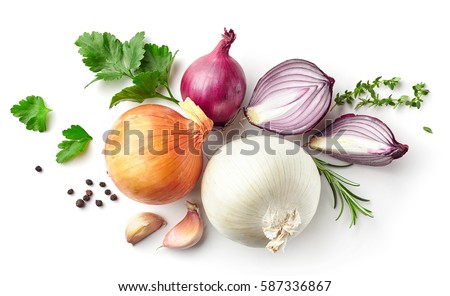At the risk of making onion-growing seem complicated (it isn't) remember that the more information you start with, the greater your chances that your first growing season will be a whopping success story rather than ho-hum. That brings us to another three categories onions fall into:
Long-day onions, covers all of Oregon, Nebraska and Pennsylvania and cuts through Illinois, Indiana and Ohio. These form bulbs with 14 to 16 hours of daylight, usually in zone 6 and colder regions of the north, and are planted in late winter and early spring.
Intermediate-day onions hit a wide swath, taking in the top half of California and Texas, and cut through Mississippi, Alabama and Georgia. They form bulbs with 12 to 14 hours of sunlight and grow best in zones 5 and 6. They're also planted in the fall where winters are mild and early spring in northern regions.
Short-day onions are the bottom quarter of the states in a semi-circle, so every one of the southern states — generally zone 7 or warmer — fall into this category. They form bulbs within 10 or 12 hours of daylight, require mild winters and when planted in the fall, mature in late spring. In the north, bulbs are smaller.
According to Marshall, flavor and pungency are often what determines the type of onion to look for. Sweet, white onions are long-day varieties while strong-flavored yellow onions fall into the intermediate or short-day categories. When planting, select an area in full sun so your onions won't be shaded by other plants. As far as soil type, it should be well-drained and loose, because compacted soil restricts bulb development. Plant in well-drained highly organic soil.
Reducing the amount of tilling you do and avoiding synthetic fertilizers and nitrogen will help increase the soil's organic matter naturally. Rotating your onions with other crops regularly also reduces the loss of soil nutrients. The minerals and micronutrients already present in your soil negate the insistence that chemicals, including herbicides, are needed to grow healthy crops, though adding compost is universally beneficial.
Article Source: mercola.com
Long-day onions, covers all of Oregon, Nebraska and Pennsylvania and cuts through Illinois, Indiana and Ohio. These form bulbs with 14 to 16 hours of daylight, usually in zone 6 and colder regions of the north, and are planted in late winter and early spring.
Intermediate-day onions hit a wide swath, taking in the top half of California and Texas, and cut through Mississippi, Alabama and Georgia. They form bulbs with 12 to 14 hours of sunlight and grow best in zones 5 and 6. They're also planted in the fall where winters are mild and early spring in northern regions.
Short-day onions are the bottom quarter of the states in a semi-circle, so every one of the southern states — generally zone 7 or warmer — fall into this category. They form bulbs within 10 or 12 hours of daylight, require mild winters and when planted in the fall, mature in late spring. In the north, bulbs are smaller.
According to Marshall, flavor and pungency are often what determines the type of onion to look for. Sweet, white onions are long-day varieties while strong-flavored yellow onions fall into the intermediate or short-day categories. When planting, select an area in full sun so your onions won't be shaded by other plants. As far as soil type, it should be well-drained and loose, because compacted soil restricts bulb development. Plant in well-drained highly organic soil.
Reducing the amount of tilling you do and avoiding synthetic fertilizers and nitrogen will help increase the soil's organic matter naturally. Rotating your onions with other crops regularly also reduces the loss of soil nutrients. The minerals and micronutrients already present in your soil negate the insistence that chemicals, including herbicides, are needed to grow healthy crops, though adding compost is universally beneficial.
Article Source: mercola.com


No comments:
Post a Comment
Please leave a comment. Thank you.